Warning! Contains spoilers regarding the plot of 'Nineteen Eighty-Four'. 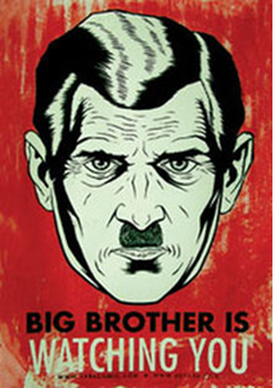 My fourth novel, 'The Second Captive', deals with the fascinating psychological phenomenon known as Stockholm syndrome. (More about what Stockholm syndrome entails later on.) Originally, I decided to blog about this as part of my 'Five' series, in which I examine five examples of anything fictional. No problem, I thought; I'll find the requisite number of novels about Stockholm syndrome and blog about them, and how they resemble or contrast with my own novel. Except it wasn't that easy. Mainstream fiction about Stockholm syndrome seems thin on the ground. Oh, I came up with lots of books professing to examine Stockholm syndrome. On closer examination, though, they all centred on BDSM themes, leaning towards the 'Fifty Shades of Grey' type of fiction. That's definitely NOT what 'The Second Captive' is about! So much for my original idea! Then I remembered one of my favourite novels, a book that made a huge impact on me when I first read it. A novel of such stature that I don't need four others for this blog post. One with a strong theme of Stockholm syndrome. That novel is 'Nineteen Eighty-Four' by George Orwell. What is Stockholm syndrome?  The former Kreditbanken The former Kreditbanken Before we examine 'Nineteen Eighty-Four' in more detail, let me explain what Stockholm syndrome is. For most of us, the concept is a weird one. How can someone profess to love the person who has captured them, held them against their will, even threatened them with death? The term originated after a bank robbery in Sweden in 1973, during which two robbers entered the Kreditbanken bank in Stockholm. A hostage situation ensued. For six days, the robbers held four people at gunpoint, locked in a bank vault, explosives strapped to their bodies, nooses around their necks. Bizarrely, upon their release, the hostages defended their captors; one set up a fund to cover their legal fees. Two of the women even became engaged to them. Thus the term "Stockholm syndrome" was coined. Other notable victims of Stockholm syndrome include Patty Hearst, who was kidnapped by the Symbionese Liberation Army but ended up joining their cause, and Natascha Kampusch, who wept when her abductor, Wolfgang Priklopil, committed suicide. So how does this strange psychological condition arise? Experts say at least three traits must be present: 1. A severely skewed power relationship between the individuals concerned. The captor decides what the hostage/prisoner can and cannot do. 2. The captor threatens the hostage/prisoner with physical harm or even death. 3. The hostage/prisoner holds a strong instinct for self-preservation. However, he believes he cannot escape and that survival is dependent upon the captor. Isolation from external points of contact enhances this viewpoint. Most of us have never been in such a desperate situation as the Kreditbanken hostages. If we endeavour to imagine what they endured, Stockholm syndrome seems less weird. If the only way to survive is to ally oneself with one's captor, is it not understandable that such feelings might deepen into something akin to love? Losing my fictional innocence... 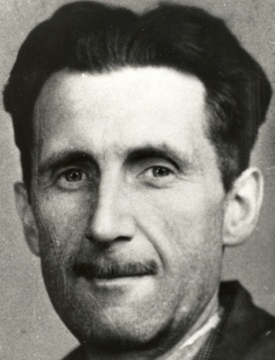 George Orwell, courtesy of Wikipedia George Orwell, courtesy of Wikipedia Let's turn now to 'Nineteen Eighty-Four.' I first read George Orwell's chilling novel in my teens, and since then I have been drawn back repeatedly to the book chosen by Time magazine as one of the best English-language novels published between 1923 and 2005. Orwell's story of life under a harsh totalitarian regime made a huge impression on me, partly because personal freedom is something I value greatly, but also because the novel's ending stripped away my fictional innocence. I remember approaching the second half wondering how Orwell was going to arrange the happy finale I was certain was coming. The one in which the Party is overthrown, democracy is restored, and Winston and Julia are free to carry on their relationship. As the number of words left for me to read grew ever fewer, I became increasingly perplexed. How, I asked myself, can all this be resolved when the book is running out of pages? Then I read the last chapter, a stunning conclusion to an outstanding novel, one which shattered every one of my naïve notions. A chilling dystopian nightmare of a world 'Nineteen Eighty-Four' is a perfect example of a dystopian novel. Set in a world where individualism is persecuted and labelled as 'thoughtcrime', it paints a bleak portrait of life under a harsh political system known as Ingsoc. The novel is based in the United Kingdom, now renamed 'Airstrip One', part of the superstate Oceania. Orwell describes a world of perpetual war, with Oceania always fighting one of the other two superstates, called Eurasia and Eastasia. Life is tough for the inhabitants of Airstrip One. The news is manipulated, citizens exist under constant surveillance, living conditions are squalid and there are shortages of basic necessities. Unless you're a member of the Inner Party, that is, the top 2% of the population who make up the ruling elite. For them, life is comfortable, prosperous, privileged. The rest of the country is split between the middle-class Outer Party members and the working-class 'proles', whom the Party largely ignores. At the very top of the system is Big Brother, around whom an immense personality cult has sprung up, even though it's unclear as to whether he actually exists. No happy ending for this novel... 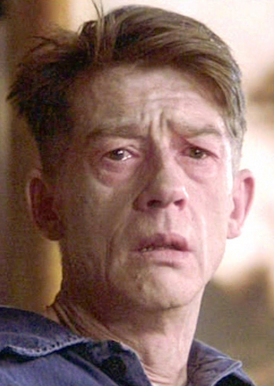 John Hurt as Winston Smith John Hurt as Winston Smith In this dystopian nightmare lives Winston Smith, an ageing Outer Party member, who works at the Ministry of Truth, rewriting recent history to reflect the current Party stance. Outwardly, Winston toes the Party line, but inwardly he hates the system and Big Brother, striving to make contact with The Brotherhood, a shadowy organisation dedicated to overthrowing the Party. Along the way he embarks on a passionate affair with a woman called Julia. They meet clandestinely in a squalid rented room, before being discovered and arrested. Winston undergoes a brutal ordeal of torture and interrogation, during which he encounters the chilling O'Brien, a member of the Inner Party and an interrogator at the Ministry of Love. O'Brien leads Winston's mind through the three stages of rehabilitation necessary for a good Party member: learning, understanding and acceptance. Then Winston is released, a free man. He slides into alcoholism, but also displays the symptoms of Stockholm syndrome. Alone, downing gin at the Chestnut Tree Cafe, he's pleased he's achieved a victory over himself, ending his previous "stubborn, self-willed exile" from the love of Big Brother, a love he now returns. An unequal balance of power 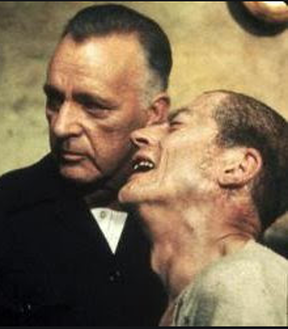 Winston and O'Brien Winston and O'Brien Let's look at how the relationship between Winston and O'Brien evinces the three key components of Stockholm syndrome. Firstly, the presence of a severely skewed power relationship. Tick number one. Winston Smith is a prisoner in the Ministry of Love, completely at O'Brien's mercy. Secondly, the threat of physical harm or death. O'Brien tortures Winston, including exposing him to his deepest, darkest fear - rats - in the dreaded Room 101. As for death, Winston's work at the Ministry of Truth has made him aware that Party opponents are routinely killed and written out of existence. Another tick here, then. Thirdly, Winston holds a strong instinct for self-preservation, evident in his love for Julia and his desire for a fairer world. Final tick. Despite the fact he's his torturer, O'Brien positions himself as both a father figure and a friend to Winston. Even in the interrogation scenes, an intimacy flourishes between the two men, with O'Brien showing an uncanny ability to know what Winston is thinking. Even as he inflicts pain on his victim, he professes to be doing it for Winston's own good, to save and purify him. The ground has been prepared, therefore, ready for the seeds of Stockholm syndrome to germinate. And that's exactly what happens. By the end of the novel, Winston's capitulation is complete. Evidenced by the incredible closing paragraph, as Winston stares at a poster of Big Brother: "He gazed up at the enormous face. Forty years it had taken him to learn what kind of smile was hidden beneath the dark moustache. O cruel, needless misunderstanding! O stubborn, self-willed exile from the loving breast! Two gin-scented tears trickled down the sides of his nose. But it was all right, everything was all right, the struggle was finished. He had won the victory over himself. He loved Big Brother. " Powerful stuff! Stockholm syndrome and my fourth novel 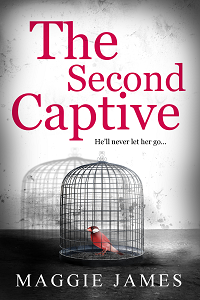 So how do I demonstrate Stockholm syndrome in 'The Second Captive'? Again, let's look at the three key components (without giving plot spoilers!) 1. There exists an unequal power relationship between my protagonist, the emotionally immature Beth Sutton, and Dominic Perdue, the man who abducts her and holds her captive by locking her in the basement of his house. 2. He mistreats her, demanding absolute compliance with his wishes. Whilst he's not a torturer like O'Brien, he does lead Beth to believe he's a killer. She fears her life may be in danger if she doesn't fall in with his wishes. 3. Beth is young, with a strong sense of self-preservation, demonstrated by her desperation to be reunited with her mother. Isolated as she is, though, the effects of Stockholm syndrome gradually creep up on her… Here's a taster: Beth Sutton is eighteen years old when Dominic Perdue abducts her. Held prisoner in a basement, she’s dependent upon him for food, clothes, her very existence. As the months pass, her hatred towards him changes to compassion. Beth never allows herself to forget, however, that her captor has killed another woman. She has evidence to prove it, as well as Dominic’s own admission of murder. Then Beth escapes… And discovers Dominic Perdue is not a man who lets go easily. Meanwhile, despite being reunited with her family, she spirals into self-destructive behaviour. Release from her prison isn’t enough, it seems. Can Beth also break free from the clutches of Stockholm syndrome? A study of emotional dependency, 'The Second Captive' examines how the mind makes dark choices under duress. Available from Amazon - click or tap the picture or this link: The Second Captive.
0 Comments
Leave a Reply. |
Categories
All
Subscribe to my blog!
Via Goodreads
|
Join my Special Readers' group and receive a free copy of 'Blackwater Lake'!
|
Privacy policy Website terms and conditions of use
Copyright Maggie James 2018 - current date. All rights reserved.
Copyright Maggie James 2018 - current date. All rights reserved.
 RSS Feed
RSS Feed
